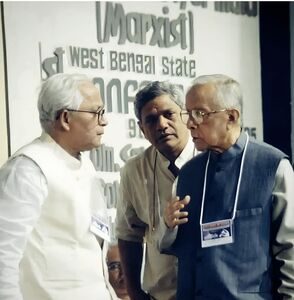The Indian Left has never been a monolith. It has splintered, evolved, redefined, and often contradicted itself across generations. Nowhere is this more visible than in the trajectories of three prominent leaders of the Communist Party of India (Marxist): Jyoti Basu, Buddhadeb Bhattacharya, and Sitaram Yechury. All three carried the red flag. All believed in Marx. But each did so in his own time, with his own interpretation, and with a different shade of conviction.
Jyoti Basu: The Communist Statesman of the Lenin-Stalin Era
Jyoti Basu was a product of classical Marxism. A man shaped by the trauma of Partition and the fervor of post-independence politics, Basu believed in the apparatus of the Party, the discipline of the cadre, and the revolutionary potential of a vanguard state. He was a firm believer in the Soviet model, drawing inspiration from Lenin and Stalin. His approach was institutional, almost bureaucratic—yet underpinned by a strong ideological spine.
His long tenure as West Bengal’s Chief Minister (1977–2000) was marked by pragmatic governance through Marxist means. Land reforms like Operation Barga empowered the rural poor, yet he remained committed to centralized control, sometimes to the detriment of innovation or dissent. To Basu, Communism was not to be deconstructed. It was to be implemented.
He famously declined the prime ministership in 1996,on the behest of his party, later calling it a “historic blunder.” But perhaps it wasn’t a blunder in his eyes — perhaps it was simply the limits of a Marxist in the mould of the Cold War.
Buddhadeb Bhattacharya: The Intellectual Who Questioned Marx
If Basu was the Party’s iron, Buddhadeb Bhattacharya was its conscience. Soft-spoken, literary, and often aloof, Buddhadeb was not merely a Marxist; he was a thinker who tried to reconcile ideology with the demands of modernity. He inherited the chief ministership from Basu in 2000 and immediately set the state on a new course.
He welcomed industry. He courted capital. He spoke of “a new Left” that could co-exist with globalisation. His vision was not Leninist but reformist, and in many ways tragic. The Singur and Nandigram episodes—where land acquisition for industrial projects led to brutal clashes—revealed the painful limits of a Marxist trying to be modern. The same rural base that once trusted the Party turned against it.
Yet Buddhadeb never stopped being a Marxist. He just tried to interpret Marx, not recite him. And in doing so, he alienated both the dogmatists within the party and the masses who once saw the Left as a protector. He was a man caught between the poetry of ideals and the prose of governance.
Sitaram Yechury: The Pragmatist Seeking Consensus
Sitaram Yechury was perhaps the most parliamentary of the three. An articulate leader, fluent in both ideological dialect and democratic negotiation, he represented a Marxism that sought relevance through coalition, not confrontation. While he has never held executive office like Basu or Bhattacharya, Yechury was pivotal in shaping the CPI(M)’s national stance in recent decades.
His Marxism was pragmatic, democratic, and tempered by realpolitik. He was willing to ally with bourgeois parties to keep the BJP at bay. He had often spoken of building consensus, even when that meant ideological compromise. Some purists in the Party saw him as too soft. But Yechury saw politics not as a battlefield of absolutes, but as a chessboard of shifting alliances.
His strength was in communication, and his limitation, perhaps, in execution. He embodied a class of Marxism that had moved away from the revolution and content lobbying within Parliament.
Jyoti Basu, Buddhadeb Bhattacharya, and Sitaram Yechury represent three generations, three instincts, and three dilemmas of the Indian Left.
Basu believed in the system and sought to control it.
Bhattacharya believed in ideas and sought to change the system.
Yechury believed in the moment and sought to negotiate with the system.
All three were, Marxists. Yet no two of them were the same. In their differences lies the story of the CPI(M) — a party constantly at war with time,with itself, and with its relevance in modern India.

